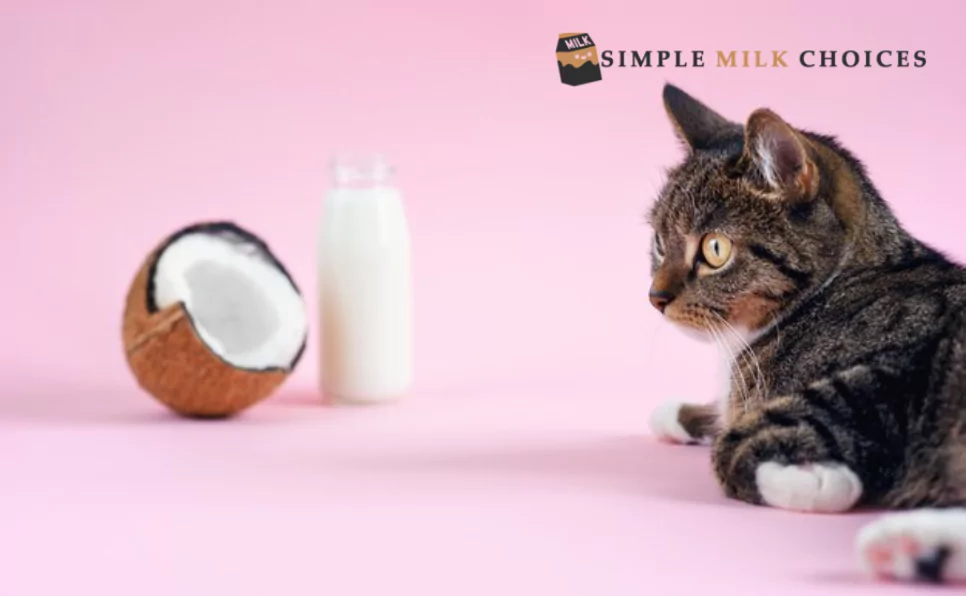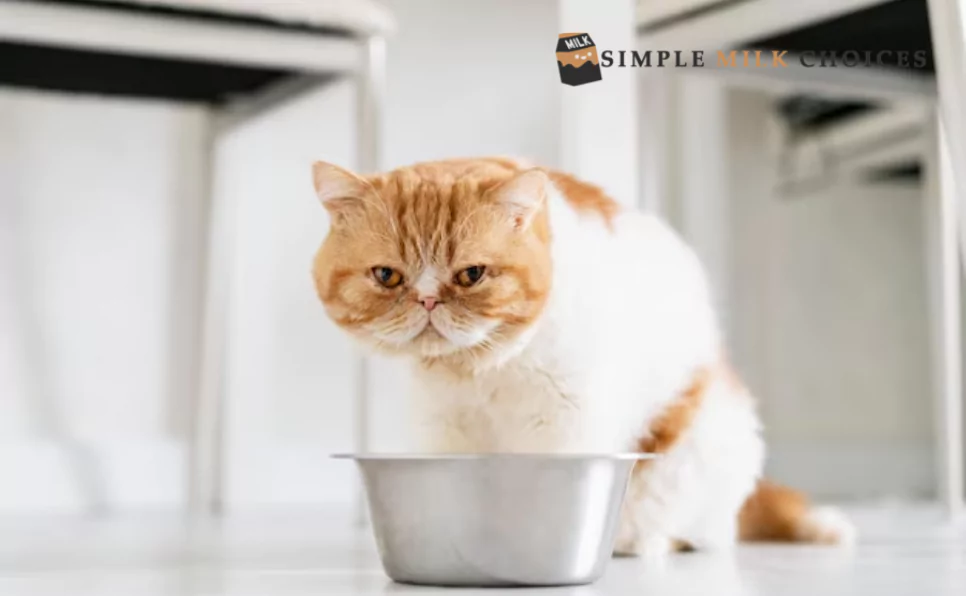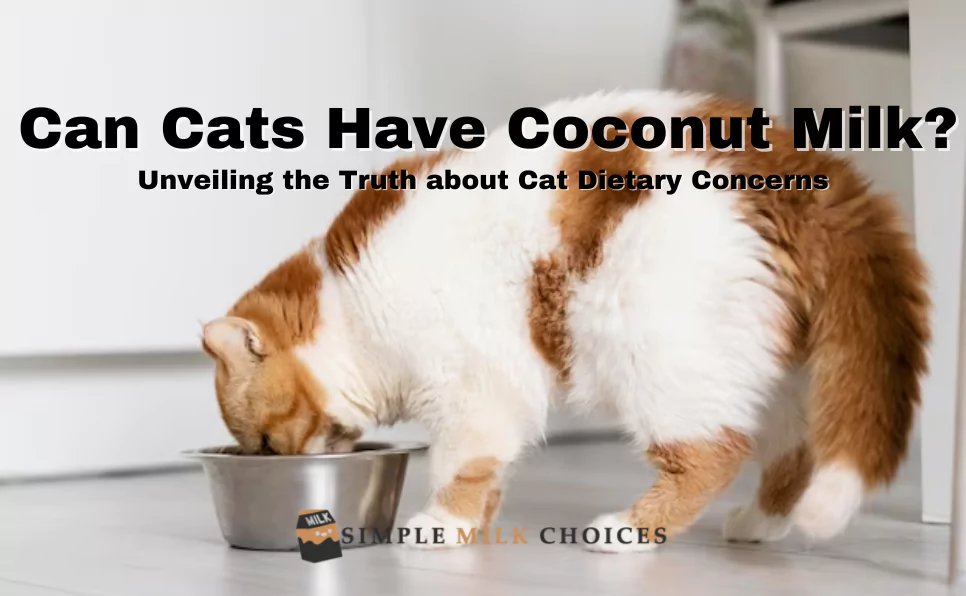Assume this: a lazy afternoon, your cat lounging by the window, and you enjoying a refreshing glass of coconut milk. The scene seems beautiful, but have you ever wondered if your feline companion could join in on this tropical delight?
Imagine their curious look as you savor the creamy goodness—it’s a compelling thought. But hidden behind this charming scene lies a crucial question: Is it okay for cats to have coconut milk?
In recent years, coconut milk has surged in popularity, hailed for its stated health benefits and versatility in various cuisines. This creamy liquid is derived from the flesh of coconuts. It has become a staple in many households, is praised as a dairy alternative, and is celebrated for its unique taste.
Coconut milk has gained popularity as a human health beverage. But a crucial question arises: Can cats safely consume this tropical concoction? This article looks into this question, exploring the safety concerns and potential risks associated with incorporating coconut milk into a feline’s diet.
Understanding Cat Nutrition
Cats are amazing creatures with an evolutionary history as obligate carnivores. They boast a digestive system designed with great care for meat consumption. Their bodies excel at extracting essential nutrients, particularly proteins and specific nutrients inherent in animal-based diets. This biological distinction underscores the vital importance of catering to their carnivorous nature when addressing their dietary needs.
Lactose Intolerance
Lactose intolerance is a common trait among cats, stemming from the lack or reduced presence of lactase, the enzyme crucial for breaking down lactose in dairy products. This intolerance raises concerns about incorporating coconut milk, which contains lactose, into their diet. Have you ever wondered if cats can have oat milk? For most cats, dairy products like coconut milk may lead to digestive disturbances and discomfort, deterring them from indulging in such options.
Fat Sensitivity
Cats exhibit remarkable sensitivity to high-fat diets. Excessive fat intake poses a plethora of health risks, including obesity and potential complications like pancreatitis, a painful inflammation of the pancreas. Considering coconut milk’s notable fat content, introducing this beverage to cats might disrupt their delicate nutritional balance, inviting a host of health issues.
Understanding these critical aspects of feline nutrition illuminates the potential challenges and risks associated with incorporating coconut milk, a high-fat, and potentially lactose-containing substance, into a cat’s diet.

Exploring Coconut Milk Composition
Understanding the Components of Coconut Milk
Coconut milk, the creamy mixture derived from the flesh of mature coconuts, comprises a blend of coconut water and coconut meat. This combination, often enriched with added fats and sugars for flavor enhancement and texture, creates the beloved beverage. These components make it appealing for humans to consume. However, their effects on a cat’s diet need a closer look.
Fat Content Analysis
Coconut milk boasts a notable fat content, primarily saturated fats. Cats lean towards leaner protein sources for their dietary needs. The surplus fat in coconut milk could disrupt their nutritional equilibrium. Comparing this fat content against the recommended dietary fat levels for cats underscores the potential imbalance and its implications for their health.
Potassium Levels
An often overlooked aspect of coconut milk is its rich potassium content. While potassium is an essential mineral, excess amounts might pose risks, especially for cats predisposed to certain kidney conditions. Understanding this element of coconut milk’s composition sheds light on its potential impacts on cat health.
The intricate composition of coconut milk, encompassing various elements that might not align with a cat’s dietary requirements, prompts a closer examination of its compatibility with their physiological needs.
Also Read: What Does Coconut Milk Taste Like?
Exploring the Effects of Coconut Milk on Cats
Digestive Issues
Cats consuming coconut milk might experience gastrointestinal disturbances due to their inability to efficiently digest certain components present in this beverage, just as oat milk causes digestive issues. These disturbances could manifest as diarrhea or vomiting, unsettling their delicate digestive equilibrium and causing discomfort.
Pancreatitis Risk
The richness of coconut milk in fat content raises concerns about its potential to trigger pancreatitis, a severe inflammatory condition affecting the pancreas in cats. This condition can be excruciating and poses substantial health threats, highlighting the importance of cautious considerations regarding coconut milk intake for these feline companions.
Long-Term Health Implications
Prolonged and consistent consumption of coconut milk could potentially lead to chronic health issues in cats. From digestive disturbances to more severe conditions, the cumulative impact of regularly exposing cats to this unfamiliar dietary element necessitates a closer examination of the potential long-term repercussions on their well-being.
These explorations underscore the importance of assessing the risks and potential adverse effects of introducing coconut milk into a cat’s diet, emphasizing the need for caution and informed decisions regarding their nutritional intake.

Safe Alternatives for Cats
Hydration Options
Optimal hydration is paramount for a cat’s well-being. Fresh water sources and cat-specific water fountains offer ideal hydration alternatives, ensuring adequate fluid intake for their health. Encouraging frequent water consumption through accessible and appealing water sources is key to preventing dehydration, especially in cats that may not be inclined to drink ample water.
Healthy Treats
Offering nutritious and cat-friendly treats aligns with their dietary needs. Lean protein snacks or commercially available cat treats cater to their carnivorous instincts while ensuring they receive adequate nutrition without the risks associated with unfamiliar substances like coconut milk.
Consulting Veterinarians
The cornerstone of responsible pet care revolves around seeking professional advice from veterinarians. Emphasizing the significance of consulting with a veterinarian regarding any dietary concerns for cats cannot be overstated. Veterinary guidance ensures a tailored approach to feline nutrition, addressing individual health conditions and specific dietary needs.
Conclusion
Throughout this exploration, the potential risks of incorporating coconut milk into a cat’s diet have been illuminated. From digestive disturbances to the risk of triggering serious conditions like pancreatitis, the compatibility of coconut milk with a feline’s physiology raises significant concerns.
It’s cautious to advise against feeding coconut milk to cats. Opting for a nutritionally balanced feline diet that aligns with their carnivorous nature and fulfills their dietary requirements ensures their well-being and reduces the likelihood of adverse health effects associated with unfamiliar dietary elements.
Final Thought
Responsible pet ownership extends beyond affectionate cuddles and engaging playtime. It encompasses making informed decisions about their diet and well-being. We prioritize informed dietary choices. Seeking professional guidance from veterinarians paves the way for a healthier, happier life for our beloved feline companions.
In the realm of feline nutrition, steering clear of potentially harmful elements like coconut milk while focusing on a well-balanced and tailored diet remains a cornerstone of responsible pet care.





